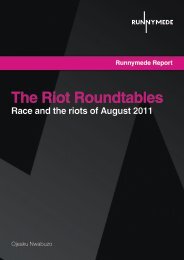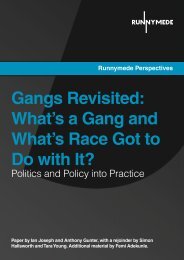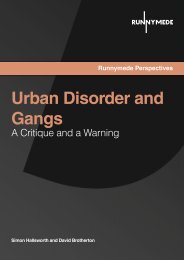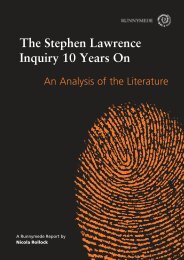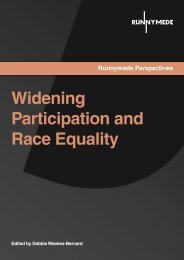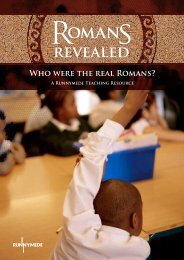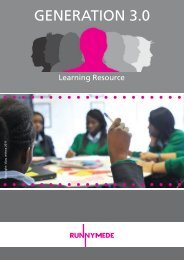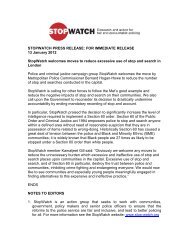PARENTINg - Runnymede Trust
PARENTINg - Runnymede Trust
PARENTINg - Runnymede Trust
You also want an ePaper? Increase the reach of your titles
YUMPU automatically turns print PDFs into web optimized ePapers that Google loves.
feature<br />
Challenging Assumptions<br />
Chamion Caballero discusses the initial findings from<br />
her interviews with 30 lone mothers of mixed race<br />
children about their experiences of parenting and the<br />
types of support or problems they encountered<br />
‘Picture the parents of a mixedrace<br />
child, and what do you see?<br />
If you believe the stereotypes,<br />
you will probably imagine a<br />
youngish white mother, probably<br />
on a council estate, pushing her<br />
frizzy-haired baby in a buggy,<br />
with the unreliable black father<br />
nowhere to be seen.’<br />
The Guardian, 26 September 2007<br />
As vividly described by the Guardian’s<br />
Laura Smith, the perception of mixed race<br />
families is one which is still rooted in the<br />
image of lone motherhood. Longstanding<br />
assumptions of these mothers as culturally<br />
isolated and materially disadvantaged<br />
have also tended to presume inherent<br />
difficulties in their family lives, including<br />
their inability to raise their children with<br />
a strong and healthy sense of self. Yet a<br />
recent project funded by the Economic<br />
and Social Research Council on the<br />
everyday experiences of lone mothers<br />
of mixed race children presents a very<br />
different picture of this group.<br />
In the one year study, ‘Insiders’<br />
or ‘Outsiders’?: Lone Mothers of<br />
Children from Mixed Racial and Ethnic<br />
Backgrounds, Dr Chamion Caballero<br />
spoke to 30 lone mothers of mixed race<br />
children about their experiences of<br />
parenting and the types of support or<br />
problems they encountered. The findings<br />
challenged the assumptions surrounding<br />
this group in a number of ways, not least<br />
that far from being ‘racially illiterate’ the<br />
majority actively sought to provide a<br />
sense of racial and cultural awareness<br />
and belonging for their children, as well<br />
as for themselves.<br />
Racial and cultural literacy<br />
Traditional perspectives on lone mother<br />
mixed racial and ethnic families have<br />
tended to assume that these are headed<br />
by white women who demonstrate a<br />
lack of ‘racial literacy’ – those cultural<br />
strategies and practices parents use<br />
to instil a positive sense of identity and<br />
belonging in their children and to help<br />
them counter racism and prejudice.<br />
Mothers in this study were not only aware<br />
of this assumption, but strongly refuted<br />
this as part of their personal experience.<br />
Firstly, the findings demonstrate that<br />
lone mothers of mixed race children<br />
are less homogenous than commonly<br />
imagined. Even in this small sample, over<br />
a third of mothers, including those who<br />
identified themselves as ‘white British’,<br />
described themselves as being from a<br />
‘mixed’ background, racially, ethnically<br />
or culturally. This subset of mothers<br />
frequently described how the diversity in<br />
their own backgrounds meant they were<br />
familiar or comfortable with mixedness<br />
even before they had their children.<br />
Secondly, mothers across the sample<br />
spoke strongly about the importance<br />
of passing on racial and cultural<br />
knowledge to their children, which they<br />
did in a number of ways. In addition to<br />
conversations about race and racism,<br />
everyday practices such as cooking or<br />
hair care were key means through which<br />
mothers informed children about their<br />
cultural heritage. Moreover, mothers<br />
also drew on outside resources in order<br />
to achieve these aims, namely through<br />
contact with the children’s fathers,<br />
extended families and communities.<br />
The role that fathers and extended<br />
family could play in transmitting cultural<br />
knowledge or connecting the children to<br />
their heritage was important to many of<br />
the mothers, although they felt themselves<br />
to be culturally literate. Indeed, a number<br />
of the mothers said that they had worked<br />
very hard to maintain these relationships,<br />
especially with fathers, even though<br />
doing so could be incredibly complex<br />
and challenging.<br />
Identity<br />
The last two decades have seen a<br />
notable challenge to the idea of mixed<br />
race people as inherently ‘confused’ and<br />
‘marginalised’. Contemporary research<br />
argues instead that such identities are<br />
fluid but stable, and this perspective<br />
was certainly supported by mothers’<br />
accounts of their children’s identities.<br />
Mothers overwhelmingly indicated that<br />
they did not see ‘mixedness’ as being<br />
problematic. Rather, they felt that their<br />
children had a well-balanced and positive<br />
sense of identity which was a distinctly<br />
‘mixed race’ one. Yet in their accounts<br />
mothers also stressed different aspects<br />
of their children’s identities as important,<br />
whether this was their ‘mixedness’ (e.g.<br />
European and African), a particular<br />
aspect of their heritage (e.g. black,<br />
Afghan, Christian) or their individuality<br />
(e.g. ‘she’s just Alexa’). These different<br />
approaches to difference and belonging<br />
– ‘mixed’, ‘single’ and ‘individual’ – are<br />
similar to those identified in previous<br />
research on couple parents.<br />
What was seen as problematic, however,<br />
were external perceptions of their<br />
situation. Mothers talked positively about<br />
raising mixed race children and noted<br />
that, where problems had occurred<br />
regarding racial and cultural identities,<br />
these were largely due to encountering<br />
negative social attitudes outside the<br />
home, including amongst professionals<br />
and practitioners. While mothers<br />
stressed that such attitudes tended not<br />
to dominate their everyday experience,<br />
they noted that they could certainly<br />
shape them.<br />
With little known about the everyday<br />
lives of lone mothers with mixed racial<br />
and ethnic children, findings from this<br />
case study project – small-scale as<br />
they may be – are useful for generating<br />
much-needed insights into the<br />
experiences and needs of these parents.<br />
Certainly, the wide diversity of personal<br />
histories, approaches and experiences<br />
amongst the mothers spoken to in this<br />
study suggest that the building of a more<br />
complex and sophisticated picture of<br />
what it means to be the lone mother of<br />
mixed race children is long overdue.<br />
Findings from the project will be<br />
published in November 2011. For further<br />
details about the findings or the study,<br />
contact c.caballero@lsbu.ac.uk<br />
12 | RUNNYMEDE BULLETIN | Autumn 2011 / issue 367 www.runnymedetrust.org



